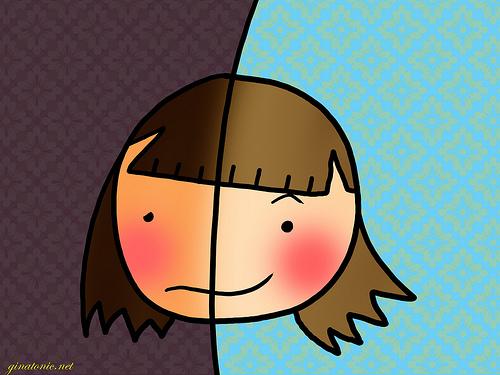The bipolar disorder(TBP) is also known as bipolar affective disorder(TAB) and more colloquially, state manic-depressive. It is characterized by sudden changes in mood and behavior. It can appear in infancy, childhood, adolescence, or adulthood. These behavioral disorders can affect daily life. Early detection is important to be able to take the child to the corresponding professional and thus be able to initiate the appropriate psychological or pharmacological treatment, depending on the case and the professional’s opinion. For this reason, from this article, we want to guide you on how to know if my child suffers from bipolar disorder since it presents differently in children or adolescents.
It is characterized by sudden changes in mood and behavior. It can appear in infancy, childhood, adolescence, or adulthood. These behavioral disorders can affect daily life. Early detection is important to be able to take the child to the corresponding professional and thus be able to initiate the appropriate psychological or pharmacological treatment, depending on the case and the professional’s opinion. For this reason, from this article, we want to guide you on how to know if my child suffers from bipolar disorder since it presents differently in children or adolescents.
Index
- In the child
- In the adolescent
- When can it happen?
In the child
Symptoms to be alert to a possible TBP in the child:
- Feel depressed
- Irritability
- Long-lasting mood swings
- Night terrors
- Whims
- Impulsiveness
- Reckless behaviors
- Explosive rage
- Separation anxiety
- Exaggerated agitation
- Little or a lot of sleep
- Enuresis
- Inappropriate behavior of a sexual nature
- Delusions and hallucinations
- Delusional thoughts
In the adolescent
Symptoms to be alert to a possible TBP in adolescents:
- Adolescents who may suffer from bipolar disorder may suffer alternate episodes of manic and depressive states, or mixed states, which would be a mixture of both states at the same time.
- In states of mania: high and expansive mood, little sleep, accelerated language, delusions of grandeur, involvement in dangerous activities, physical activity, hallucinations
- In states of depression: sadness and crying, little sleep, irritability, abandonment of activities that were previously pleasant, poor concentration, poor academic performance, delusions, suicidal ideas, changes in appetite.
When can it happen?
The genes may be a cause of child bipolar disorder, but there are also environmental factors that may be the trigger. A loss or a traumatic event can lead to such an episode. Hormonal changes in puberty can also trigger bipolar disorder, in women these sudden hormonal changes can also affect them.
In undiagnosed teens with bipolar disorder, they are often more inclined to use drugs or alcohol.
If your child has most of the symptoms mentioned above for more than two weeks, it is advisable to see a specialist as soon as possible because if you let time pass, bipolar disorder can get worse and it is also important to differentiate it from other possible disorders that may be confusing.
This article is merely informative, we do not have the power to prescribe any medical treatment or make any type of diagnosis. We invite you to see a doctor in the case of presenting any type of condition or discomfort.




